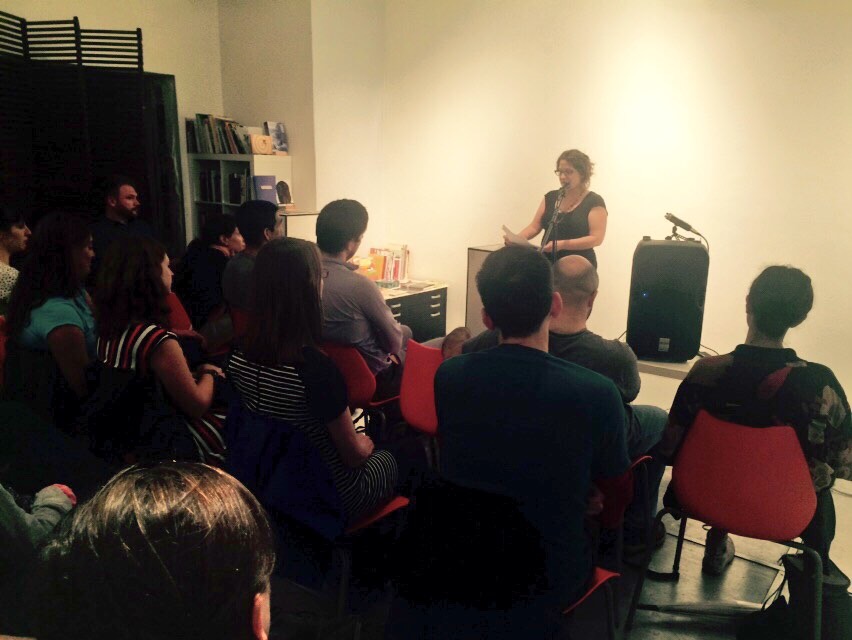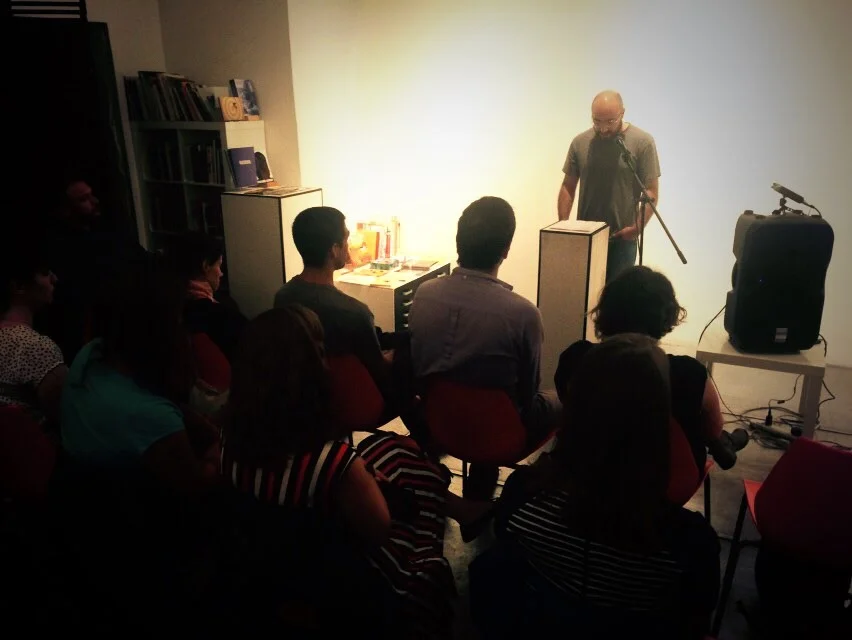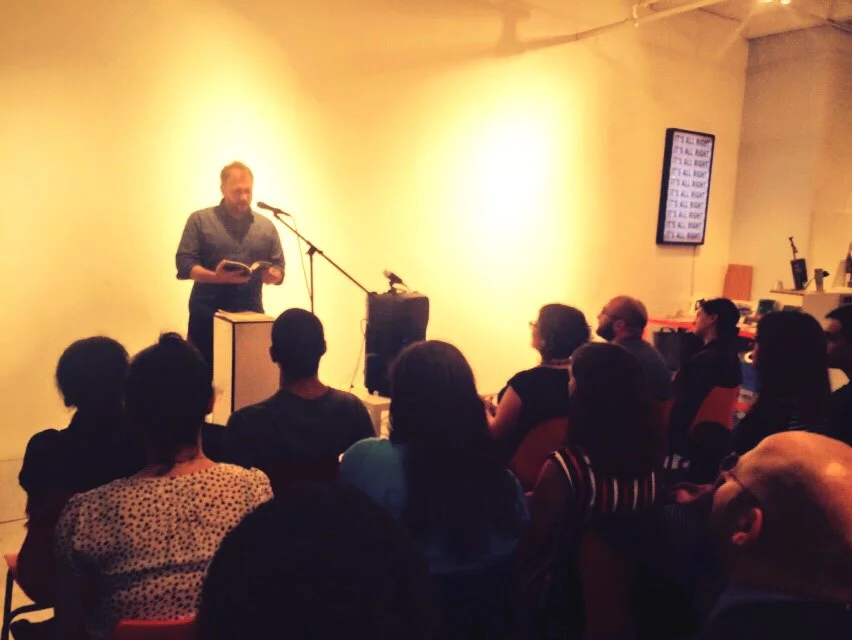A Reading featuring Lesley Yalen, Seth Landman and Vincent Zompa
Here are Jared and Farrah's collaborative introductory notes for the reading:
Seth Landman: “You try to be negative, but there is blood in your love and love in your hearts”
Seth Landman: “Every animal she says. Every animal is a sound about feeling good”
Lesley Yalen: It’s going to hurt”
The poets’ writing tonight may have fairly different temperatures but have in common this tension between love and blood. Solitude figures in all their poems and they all write with a sense of protectiveness of their conversations and their friendships, their connections with people. Vincent Zompa is described by L S. Asekoff as “a restless nomad traveling across landscapes of memory and desire” and this could be a description in a sense of all the poets reading this evening.
--
Lesley Yalen
Her soon to be publisher Natalie who suggested and Lesley suggested her fellow pioneer valley
Seth and Lesley must share an interest In walking on the moon since in an echo of Seth’s poem called The Moon Lesley has a poem called “Sea of Tranquility” and a similar working in the metaphor of distance and connection- she writes: “The Earth from the walked-on moon Like your face as seen from mine”
The difference I think is in the quality of acceleration and multiple voices in Lesley’s work – her poems can speak with a breathless rush but then she uses effects like sometimes in boxed or overlapping text to create a careening skid or a dense obstruction where the poem stops such as a repeated line like, in her chapbook THIS ELIZBETH “To day is to check the email.” She’ll write a poem with a wonderful observation like “how strange that they still use stethoscopes to hear hearts” and then juxtapose it on the page with a box containing the words “don’t / resign” Sometimes the effect is a sort of experimental comedy “It’s as if my brain has been vacuumed and only Jane Austen remains” she writes besides a deployment of industry copy about PVC signage.
Juxtaposition seems especially important not only in her technique as a writer but also in this image of juxtaposition as itself a kind of intimacy, bodies a hairsbreadth apart:
my nose a hair from
yours your eyelashes
keeping track
Her poems are curious and insistent “Tell me about every day in your life” and I think there’s a dangerous, magical quality to this intimacy, as when she writes
I did find
An arrowhead in my hand, a piece of shrapnel
From the before before before war, and I took
It upstairs with me and I put it in your back.
So we get a military relic and an act of violence but both are mediated through a scrim of mystery, like echoes of thunder getting slowly louder. Her upcoming book is called THE HEARTS OF VIKINGS and I see there too this play between the human and the wild or thuggish and the way some unknown energy sort of slingshots between them
Another poem of Lesley’s concludes:
There was a military plane inexplicably
hovering over me and I hid from it, shivering,
in the last phone booth ever.
So I think Lesley’s subject is sometimes this poignant search for refuge from inexorable processes or maybe inexorableness itself and I admire the inexorable quality Lesley harnesses in her writing. She writes: “There is inertia to keep us from going And inertia to keep us going.”
--
Seth Landman’s poems take place in the universe. By which I mean, reading his poems I keep feeling somewhere between terra incognita and ultimate thule,
His poems are quiet as if touched with a light post-apocalyptic breeze, like the night sky in a dream.
In one poem he writes “there is wind in my mind” and then “pelagic silence”
In another:
“the sea of what is before us, our feet dead forward, foreign, figurative, poetry, the poetry, poetry, the is this how I am regarded, the stranger than all the stars I am”
The space of these poems is spacious and dark but the voice of them is companionable, and Seth’s poems seek communications with all things “I did not hear my grandfather’s house say a word”.
At times I am remind me of the last moments in the movie 2001 that move rapidly between private rooms and outer space, from the intimate and the cosmic, but Seth’s work is always deeply understated and lacking in bombast. The first poem takes four lines to move from “every little thing of you” to “everything that last forever” but poses the relationship between the frail self and the humongous infinite as tenuous and uncertain. “There is nothing looming in the world like snow on the hill in the air” he writes, and “I’m here at the terminus burying my head in this nothing, that stars are the same as soil”
These are poems lit by a flickering, humanistic spirituality that veers between wryness and faith, warmth and desolation. “Mountains prescribe the thoughts I have of them. They get boring, no they get bored and concentrate on transcendence. My opinions are my opinions but we tear each other apart.”
Farrah reading the work this afternoon remarked that the words carry a burden a sense of pain caused by decisions that are hurtful, but then also a telling generosity, as though he’s writing to console an upset friend; Seth’s poetry speaks to familiarity, how hearing the way someone thinks for the first time can make you feel like they’ve been talking to you your whole life.
He writes “I’m just moored on the moon, not one of them… be true, God. You have all my thoughts but I have all the responsibility.” Seth’s book notes “the synagogue’s strangeness in just being there when no one else is” and talks about “get[ting] back my Yiddish”. The estrangement in these poem is existential but also takes shape as an underground poetics of exile, taking on this subject elliptically but persistently, not only in their ostensible subject matter but even on the level of syntax, evoking a subtle diaspora poetics:
“the something I am always / waiting for, the is it, what is it, what”
---
Focusing on the animality of communication, where Lesley and Seth are direct and delicate, Vincent Zompa is abstract and imaginatively loud.
In his new book from Dusie, HEARD ANIMAL, Vincent probes the overlap between Transgression and discovery.
“I dig a hole in the beach until I reach inner water. Into it I say Rules are meant to be broken”
“I do something illegal to drum up excitement”
“How goes the person? It does not ripple without forced entry”
“you have to enter the music to stop this drain”
there are a lot of holes and drains in this book, “they drain your face” or in another “the lights drain” and these carry the ambiguity of orifices. Like a stage magician, he writes: “Where is the poem you ask. Why it’s right here, my dear, behind your ear.”
On first page of the book we find “heart shaped boulders” and then on the next page “my heart word whirling”; the metaphor of the heart is important to this book but not only as a metaphor I think – the hearts in HEARD ANIMAL are not benign shapes but fleshy organs surging with blood in bodies that when cut, bleed.
“I am the replicated knife worried how easy to slice the human butter”
‘that man in the lightning might pull his face off with a razor and slink back into white”
In this spooky book full of heat and knives, words are kind of altar on which a ceremony takes place that is violent and also creative “the altar, the orange rind on it, split into four leaves of a flower. We could smell it. It smelled like violin resin, like a wild boar”
The olfactory sense is I think -his is a book full of smells, like “german shepherd” or “hair” and “morning skin”
Thus, thought we get plenty of first names in the book, the people in this book come across as vague wave-like shimmers in an incandescent landscape, as if the poems are emanating from a slightly time shifted perspective, like obituary written by aliens in another dimension that is coterminous with ours.
He writes: “two snails traversing two red and seamless earths like tomatoes spinning on their vines”
One of my favorite poem in the book, called CONTAINERS, offers a parable of digging into the self to unearth one’s inner homonculis. “I was born with a tiny me inside of me, near my hip / made of ox tongue and rhubard/ made of hair, bird bones, a gas cap, some blueberries. The surgeons cut him out, but couldn’t resuscitate him. They tapped his white lung. They warmed him in ovens. Afraid of what the loss would do, they put him back inside of me.”



